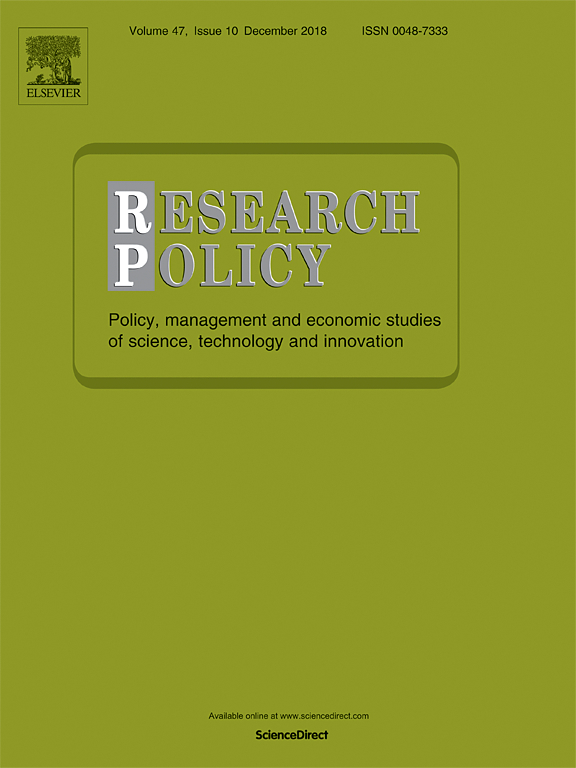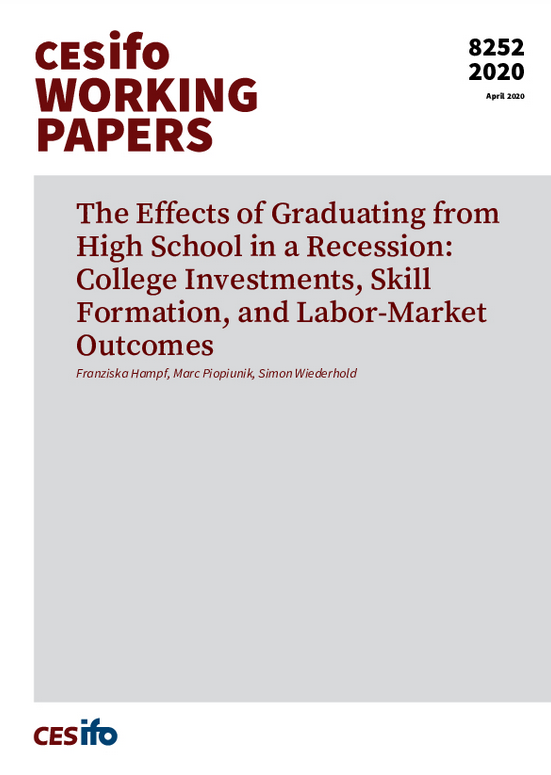Education, Skills, and the Labour Market
It is undisputed that the human capital of a nation accumulated through schooling and lifelong learning is crucially important to the economy’s innovative capacity and ability to compete in the globalized world of the 21st century. At the individual level, human capital can be regarded as skills that make workers more productive in performing their work tasks and as the knowledge and competencies that enable people to generate and adopt new ideas that spur innovation. At the macroeconomic level, human capital can accelerate economic growth by increasing aggregate productivity and by facilitating the creation and diffusion of new technologies.
One stream of research in the group “Education, Skills, and the Labour Market” deals with the formation of skills. The focus is on family background, formal education, and on-the-job training as determinants of skill development. In terms of family influences, we see substantial intergenerational persistence between parents and children in income, educational attainment, and occupational choices. One source of this persistence is the intergenerational transmission of cognitive skills, as we show using unique Dutch data that link comparable measures of math and language skills over generations.
However, family circumstances are not “self-inflicted” and are beyond the control of the individual; Nobel laureate James J. Heckman coined them “accident of birth”. Thus, differences in family background and support are a source of inequality – the lack of equality of opportunity. We study the effectiveness of policies to support children and youths from disadvantaged families, in particular, early child care and mentoring programmes. However, one fundamental challenge with formally non-selective programmes such as universal child care is that disadvantaged families are often less able to access and utilize these programmes.
In a series of field experiments, we investigate why disadvantaged families are underrepresented in such programmes, focusing on both demand side reasons (e.g., lack of information or difficulties navigating complex application processes) and supply side reasons (e.g., discrimination of educational providers).
Related to our research on economic inequality at the individual level, we also study inequality at the regional level. Regional economic disparities, to a large extent driven by firms located in certain regions, can promote other forms of regional disparities. One such dimension in many western societies is the rise of radical right parties since the late 1980s. We contribute to this discussion by trying to understand the role of firm- und regional-level adjustments to globalization and technological change at the disaggregated European level. Particularly, we study how these significant economic changes affect vote shares of populist and nationalist parties because of the economic hardship caused by these phenomena.
Of particular interest in the research group “Education, Skills, and the Labour Market” is the intersection of labour market, education, and innovation research. As technology is changing the tasks workers perform at the job, automating certain tasks and introducing new tasks in which humans have a comparative advantage, the skills required from workers also change. A series of research projects aims at improving our understanding of the interplay between technology, skill supply, and skill demand.
For instance, we derive novel measures of worker skills by exploiting the unique setting of the German apprenticeship system, which mandates that the same practical and theoretical skills are developed in a particular apprenticeship regardless of the training location in Germany. Linking these skill measures to rich administrative labour market data, we estimate the returns to various types of skills developed during apprenticeship training, such as cognitive, social, digital, and manual skills.
Moreover, the analysis of apprenticeship plan updates will be informative about which types of skills have become more (or less) important over time, and how this interacts with the tasks that new technologies are able to perform. Furthermore, merging workers’ skill supply from apprenticeship plans with firms’ skill demand from online job vacancies allows us to investigate whether returns to skills are systematically higher in firms which require these skills. This will shed light on the complementarities between technologies and skills.
We also investigate the differences in entrepreneurship and business dynamism and their respective contributions to growth between the United States and Germany, particularly focusing on the significance of startups. While startups in the United States are well-known for their innovation and radical advancements, evidence suggests that Germany's innovation is more concentrated within established firms (i.e., incumbents). In a comparative analysis between Germany and the United States, we aim to delve into the preferences of high-skilled individuals for working in startups (vs. incumbents), to better understand the factors influencing startup activity and success in both countries.
In addition to the Germany-U.S. comparison, we will also shed light on the question to what extent the relatively low entrepreneurship rate in East Germany can be explained by individuals’ tastes for working in a startup. Starting from the observation that Germany is highly innovative and competitive despite having few startups, we then discuss how the German economy still maintains high levels of innovativeness and competitiveness.
Workpackage 1: (Unequal) Access to Education and the Formation of Skills
Workpackage 2: Returns to Skills
Workpackage 3: Innovation and Business Dynamism in Germany and the United States
Research Cluster
Productivity and InstitutionsYour contact

- Department Structural Change and Productivity
Refereed Publications

Skill Mismatch and the Costs of Job Displacement
in: Research Policy, No. 2, 2024
Abstract
Establishment closures have lasting negative consequences for the workers displaced from their jobs. We study how these consequences vary with the amount of skill mismatch that workers experience after job displacement. Developing new measures of occupational skill redundancy and skill shortage, we analyze the work histories of individuals in Germany between 1975 and 2010. We estimate difference-in-differences models, using a sample of displaced workers who are matched to statistically similar non-displaced workers. We find that displacements increase the probability of occupation change eleven-fold. Moreover, the magnitude of post-displacement earnings losses strongly depends on the type of skill mismatch that workers experience in such job switches. Whereas skill shortages are associated with relatively quick returns to the earnings trajectories that displaced workers would have experienced absent displacement, skill redundancy sets displaced workers on paths with permanently lower earnings. We show that these differences can be attributed to differences in mismatch after displacement, and not to intrinsic differences between workers making different post-displacement career choices.

Exposure to Conflict, Migrations and Long-run Education and Income Inequality: Evidence from Bosnia and Herzegovina
in: Defence and Peace Economics, No. 8, 2023
Abstract
We investigate the long-term relationship between conflict-related migration and individual socioeconomic inequality. Looking at the post-conflict environment of Bosnia and Herzegovina (BiH), a former Yugoslav state most heavily impacted by the wars of the early 1990s, the paper focuses on differences in educational performance and income between four groups: migrants, internally displaced persons, former external migrants, and those who did not move. The analysis leverages a municipality-representative survey (n ≈ 6,000) that captured self-reported education and income outcomes as well as migration histories. We find that individuals with greater exposure to conflict had systematically worse educational performance and lower earnings two decades after the war. Former external migrants now living in BiH have better educational and economic outcomes than those who did not migrate, but these advantages are smaller for external migrants who were forced to move. We recommend that policies intended to address migration-related discrepancies should be targeted on the basis of individual and family experiences caused by conflict.

Males Should Mail? Gender Discrimination in Access to Childcare
in: American Economic Association Papers and Proceedings, May 2023
Abstract
This study investigates discrimination against women when searching and applying for childcare in a nationwide field experiment. We send emails from fictitious parents to 9,313 childcare centers in Germany inquiring about access to childcare. We randomize whether the email is sent by the child's mother or father. Our results show that women receive shorter and less positive responses than men. The probability of receiving a response does not differ by gender, highlighting the importance of going beyond response rates to detect discrimination. We provide suggestive evidence that regional differences in gender discrimination are related to gender norms.

The Impact of Delay: Evidence from Formal out-of-Court Restructuring
in: Journal of Corporate Finance, February 2023
Abstract
Different types of bankruptcy restructuring procedures are used in most legal systems to decide the fate of businesses facing financial hardship. We study how bargaining failures in an under-researched type of restructuring procedure, a formal out-of-the court procedure impacts the economic performance of participating firms. Croatia introduced a “pre-bankruptcy settlement” (PBS) process in the wake of the Great Recession of 2007–2009. A novel dataset provides us with annual financial statements for both sides of more than 180,000 debtor–creditor pairs, enabling us to address selection into failed negotiations by matching a rich set of creditor and debtor characteristics. Failures to settle at the PBS stage due to idiosyncratic bargaining problems, which effectively delay entry into the standard bankruptcy procedure, lead to a lower rate of survival among debtors as well as reduced employment, revenue, and profits. We are the first study to track how bargaining failures diffuse through the network of creditors, finding a significant negative effect on small creditors, but not others. Our results highlight the impact of delay and the importance of structuring bankruptcy procedures, to rapidly resolve uncertainty about firms’ future prospects.

Returns to ICT Skills
in: Research Policy, No. 7, 2021
Abstract
How important is mastering information and communication technology (ICT) on modern labor markets? We answer this question with unique data on ICT skills tested in 19 countries. Our two instrumental-variable models exploit technologically induced variation in broadband Internet availability that gives rise to variation in ICT skills across countries and German municipalities. We find statistically and economically significant returns to ICT skills. For instance, an increase in ICT skills similar to the gap between an average-performing and a top-performing country raises earnings by about 8 percent. One mechanism driving positive returns is selection into occupations with high abstract task content.
Working Papers

The Effects of Graduating from High School in a Recession: College Investments, Skill Formation, and Labor-Market Outcomes
in: CESifo Working Paper, No. 8252, 2020
Abstract
We investigate the short- and long-term effects of economic conditions at high-school graduation as a source of exogenous variation in the labor-market opportunities of potential college entrants. Exploiting business cycle fluctuations across birth cohorts for 28 developed countries, we find that bad economic conditions at high-school graduation increase college enrollment and graduation. They also affect outcomes in later life, increasing cognitive skills and improving labor-market success. Outcomes are affected only by the economic conditions at high-school graduation, but not by those during earlier or later years. Recessions at high-school graduation narrow the gender gaps in numeracy skills and labor-market success.












